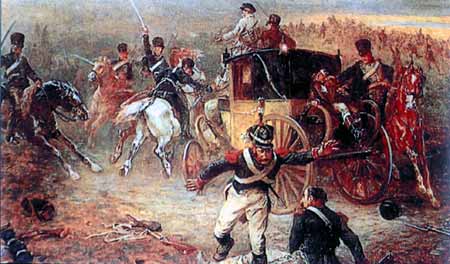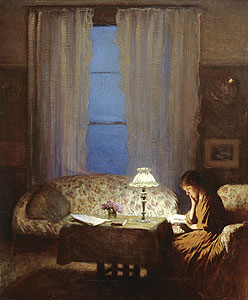X
The following Saturday morning Mary received an unexpected visitor. It was Dr. Bowcock. He had, he informed her, got to thinking about Captain Thompson's military career, and had suddenly recalled that a member of his congregation had actually marched against Napoleon in those far off days. Consequently, he had taken the liberty of arranging a meeting between Mary and this aforesaid gentleman, whose story, he asserted would almost certainly be of value to Mary in her historical searches. He then arranged to meet Mary and Dickey at the Zion Chapel on the Sunday afternoon, when he would conduct her to the residence of his mysterious informant; and so it transpired.
George Duckworth was a white haired, half blind old gentleman who lived in a single storeyed cottage on the outskirts of Rawley. He was a marvellous survival, being hale and hearty though almost in the ninetieth year of his age. He told Mary that he had enlisted in the army as a private soldier in 1808, and had marched with the British Army through Portugal, Spain and France, being wounded at the Battle of Toulouse, and afterwards shipped home. As he spoke his hands shook, yet his eyes were filled with a fiery recollection which betrayed a still vigorous spirit that had once marched with the best of them. Once, behind that tremulous voice, there had been 'a soldier, full of strange oaths and bearded like the pard.'
"Aye, I remember them days, but never liked to talk about about 'em when I were younger. There were terrible things 'appened, things I'd not like to repeat to a young lady like thissen. An army on the march lives off the land. What it wants, it teks. But the crappos were much worse ner us, (excuse me miss, by them I means the French). Boney taught 'em to mek war support war, an' thats what they did. You could allus tell wheer them crappos had been, it weren't just the smell o' ther baccy an' onions, but the burnt houses an' murdered peasants they'd left in their wake. Of course our lads didn't behave like that, for owd 'Long Nose' would've hanged 'em without so much as a 'by your leave!' But the threat o' the gallows didn't stop 'em from taking a bit of wine and plunder when they got the chance. T'Irish Teagues were t' worst for that. They were rough beggars - I once heard it said that t'Duke were more afeard o' them than the French! But they were brave lads. I was with 'em at Badajoz, they stormed the frise de chevo, a curtain o' steel it were, and the breastwork were filled with their corpses, but they came on an' on, t' living marching ovver t' dead. An' when the place fell.... well the wine ran in the streets as red as their spilt blood. We were all young men then, with a poor expectancy for the morrow, and a bent to take the pleasures of the moment. We watched them blackeyed senoritas dance in the firelight, and we drank their wine. But when we bivouacked in them sodden fields or spread our cloaks in vermin infested hovels, we took our own company and counsel. Brave lads of honour all..... But you asked me was I with Captain Thompson? Nay I knew him not. I came to work for him up at Parkfields in 1820. O' course one day I got to talkin' with him about his sodgerin' days. He were with the fighting third at Salamanca, where he got made up from Sergeant to Captain. An unheard of thing. I don't rightly know what it was he did, but it musta been a rare deed to receive such a promotion. The Captain once told me that the fighting third had been the making of him. O' course it were them happy-go-lucky beggars that fought at Vitoria and fell on uncle Joes' plunder afterwards."
"Uncle Joes plunder?"
The old man fumbled for his long clay pipe, packed it with tobacco, and then lit it with a shaking hand. "But I beg your pardon, young miss. I forget you know not of these things. Uncle Joe were Boney's brother, that King Joseph what Boneyparte appointed to rule Spain for the French. 'King o' the bottle' were what we called him. He were our chiefest foe in Spain, him and old General Salt. Well at Vitoria old long nose (I mean the Duke of Wellington) set him and his mates to the rout. I weren't theer, but I heard the tale. It were in June 1813. King Joe knew that the game in Spain were just about up for him, so he were tryin' to get his baggage train through the mountains to France. But old long nose had other plans. He brought him to battle in the Zadora Valley at Vitoria. The French lines broke, and the crappos fled in a panic to Pamplona, cuttin' the traces an leavin' their guns an' treasure wagons behind 'em. My old mate Hennessy, God rest his soul, were there. He told us what we'd missed. He said there were sacks of gold and jewels just spilt out over the road. Boxes of dollars, pictures, furniture, fine clothes, food and wine. Ladies upset from their carriages, oxen, goats, pigs. Everything what King Joseph had plundered from the Spaniards over the years was there, scattered for miles along the Pamplona Road."
"So What happened."
"Well the Duke ordered his soldiers to pursue the fleeing French - but when our lads came upon the baggage train - he couldn't control them. They simply set to a plundrin' an' that were that! They just turned the whole rout into a torchlit fairground!I heard it said afterwards that nearly half a million pounds passed into the pockets of the British Army that night!"
"And Captain Thompson? Was he there?"
"I heard so miss. He was with the thirteenth I do know. Hennessy knew of him. An upstart he called him; an officer - but not a gentleman."
Dr Bowcock scratched his head. "How so?"
"Well you must understand that he'd been made up from the ranks like. That made him, for all his finery, one of us. Yes, he was brave, a good soldier. He must have been to get where he did, but officers like him were pariahs you see. Being raised from the ranks he never really could fit in with his fellow officers, (who were gentlemen), nor could he mix with the common soldiers because of his elevation."
"I see. So do you think that Captain Thompson acquired his wealth by plunder?"
"Very possible sir. I know he built Parkfield Mill and the houses after he left the army. I donít reckon he got such wealth from his pension sir. (They gave me fourpence a day!) Its funny sir, but the other two gentlemen thought much the same thing."
"Other two gentlemen?"
The old man drew on his pipe and puffed out the smoke.
"Why certainly sir. Two brothers they seemed like to me."
Mary frowned. "Did one of them wear a red rose in his lapel?"
"Why yes young miss. How did you know that?"
"Because he was my uncle. Uncle Edwin habitually wears a red rose in his buttonhole.... and he was asking you about Captain Thompson?"
"Why yes indeed young miss, all manner o' queer questions."

Back at Parkfield once more, Mary could not get up to her room quickly enough! She lay on the bed, staring at the high ceiling, trying to make sense out of the bewildering sequence of events that now flooded her brain.
'King Joseph Bonaparte' - that explained the inscriptions on the great window and the hall floor. And the battle of Vitoria no doubt accounted for the deliberate mis-spelling of 'Victoria' that the good doctor had pointed out to her on the Zion Chapel Foundation Stone. There was no doubt about it:- all these things were pointers - but to what? A box of golden dollars plundered from the French by an opportunistic young army officer? Possibly. But Mary couldn't help but think that there was something more. Why should Captain Thompson have gone to such lengths merely to hide a box of gold coins? No. There had to be something of greater import, to justify such elaborate measures of concealment.
Then there were her uncles. What did they know about this affair? Certainly rather more than they were letting on perhaps? On the previous Wednesday Dickey had come running to her in a panic, breathlessly reporting to her that her uncles had asked him to take them up to Rawley Billing. He had taken them there (he could hardly do anything else!) and they had told him to remain with the pony while they had proceeded onto the Billing armed with kerosene lamps and ropes. Whether or not they had found the grotto he had not been able to ascertain. If one certain thing was to be derived from all this, it was that her uncles were on the same trail as themselves. There was a race in progress it would seem. But for what?
Mary pulled out her notebook and scanned the information she had gleaned from the Memorial Window and the Foundation Stone. She read over the inscription again and again. It was no good. Whatever was hidden in the supposedly innocuous inscription, it was fiendishly contrived. The end of this quest, whatever it might be, was somehow connected with Captain Thompsons exploits in the Napoleonic wars. That much, at least seemed certain. Mary now began to realise that she was getting out of her depth, and was going to need the assistance of someone more knowledgeable than herself. There was nothing for it. She would have to consult her father in this matter. At least with the body of information she had thus far collected, she might this time be agle to make him believe that here was something rather more than the mere fantasies of a young girl.




